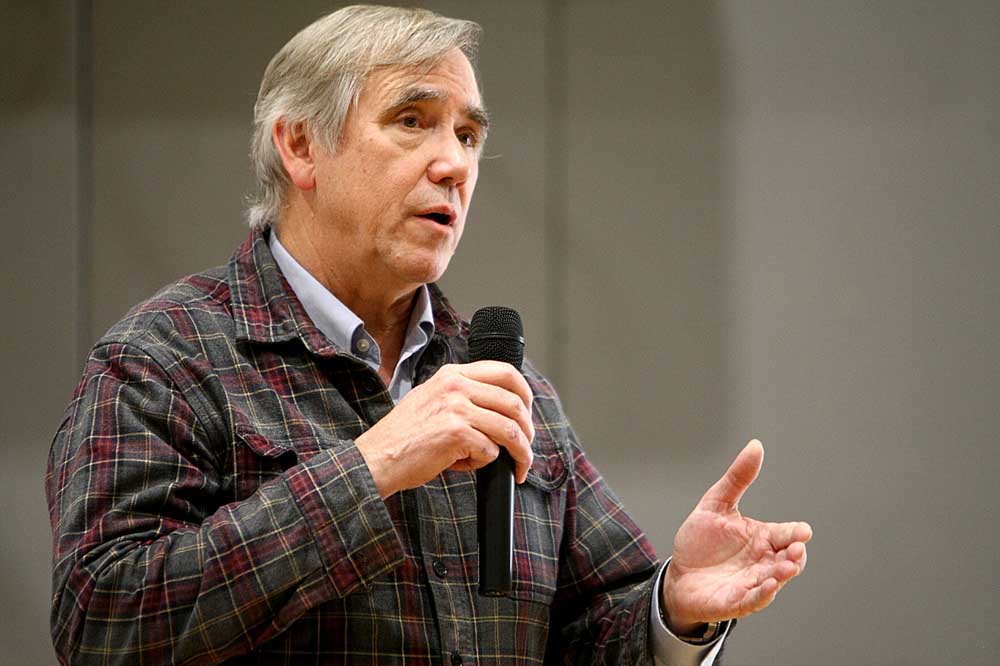Capital Chatter: Election night unfolded quickly
Published 8:00 am Thursday, November 8, 2018

- Capital Chatter: Dangerous times for the Oregon Legislature
The end came quickly for Knute Buehler.
Earlier on Tuesday evening, Oregon House Republican Leader Mike McLane had taken the stage to talk of potential GOP triumphs, even pondering the possibility of his no longer being the “minority” leader in the House.
Trending
But 40 minutes after the 8 p.m. election deadline, Republican gubernatorial candidate Buehler was conceding the race to Gov. Kate Brown. Buehler congratulated Brown and, when some in the campaign crowd booed, he waved their words away with his hand and said, “No boos.” It was a statesmanlike-moment.
It came so fast that one reporter turned to me and asked, “Did he just concede?”
The crowd expressed disappointment but not surprise. Rather, the surprises were the margin of defeat and his not holding out hope longer into election night. To his credit, he did not prolong the suspense. At what point on Election Day, I wondered, did his team realize the inevitable?
As of Thursday morning, the margin of Brown’s victory was more than 6 percentage points. Her campaign was expecting a range of 4 to 7 points – the typical margin for recent Democratic gubernatorial victories.
She called the election results “a slam dunk,” and they were for Democrats.
Phil Knight’s multi-million-dollar support for Buehler had changed the dynamics, and the Brown campaign brought in national figures to join her in “get out the vote” rallies and other events. Even though the campaign’s internal polls showed solid support for Brown, she still had to ensure that people actually voted.
Trending
This by far was the most-expensive governor’s race in Oregon history, which suggests the next one will be even costlier – unless voters adopt some form of campaign finance reform. When all the numbers are tallied, Buehler may have spent as much as the three previous GOP gubernatorial candidates combined.
Tasting victory: Portland is Oregon Democrats’ main base, and they gathered at the downtown Hilton on Tuesday evening to celebrate progressive victories. They had about 1,700 RSVPs for the party. At least 20 candidates attended, including legislative and congressional candidates as well as Brown.
In contrast, Buehler’s event at the Sentinel Hotel was for his campaign. Several hundred people were there, including Oregon GOP Chair Bill Currier and other Republican leaders.
Partisan mixes: Oregon is not quite as distinctly urban-Democrat and rural-Republican as partisans say.
As of September (the most recent voter registration figures from the state Elections Division), 51 percent of Multnomah County voters were Democrats. But the county also had the third-most Republicans in Oregon, trailing only the neighboring counties of Washington and Clackamas, as well as a large contingent of unaffiliated voters. In other words, there are more Republican voters in the Portland metro area than in any other region.
Multnomah County’s 527,169 registered voters included 62,784 Republicans, 159,912 non-affiliated voters and 268,906 Democrats.
When running for governor four years ago, Republican Secretary of State Dennis Richardson highlighted his Portland campaigning. In contrast, Willamette Week reports that Buehler picked up a smaller share of the Multnomah County vote than any other Republican gubernatorial candidate in two decades.
On the other side of the Cascades: Even lightly populated Wheeler County has a political mix. Of its 1,002 voters, 492 were Republicans and 211 were Democrats, according to the state’s September statistics.
In this week’s election, the county’s voter rolls had grown to 1,005. Its turnout of 83 percent led the state.
The suburbs speak: The theme nationally was that suburbs turned from supporting Donald Trump to backing Democrats. That held true in Scholls and West Linn, where Republican Reps. Rich Vial and Julie Parrish lost.
Oregon Democrats not only control the governorship and the Legislature, but they gained supermajorities in the House and the Senate. If Democrats stick together – never a sure thing – they won’t need Republican votes to pass tax increases. But they will need the presence of some Republicans in each chamber to have a quorum for transacting business.
Among the Republican disappointments were good candidates who lost decisively, including Jessica Gomez in Southern Oregon’s Senate District 3 and Selma Pierce in House District 20 in the Salem area. Democratic men won those races – Jeff Golden of Ashland and Rep. Paul Evans of Monmouth.
However, the 38 Democrats in the House will now include 22 women.
Which campaign strategies work: Buehler won most of the daily newspaper endorsements and had plentiful lawn signs. Brown’s campaign did more with social media than lawn signs.
Both sides assailed the other with negative ads. On Election Day, my wife even received two similar robocalls on her company phone urging voters not to believe Brown’s “lies” about Buehler — whatever that meant. Were they calls of desperation or smart politics? In either case, calling a workplace phone seemed inappropriate.
On Wednesday, I asked political scientist Jim Moore of Pacific University about negative advertising. His response:
“If negative campaigning is to work, it must be at the end of the campaign. It always rebounds on those who use it, but if that happens after a vote is already cast, the negative argument can be effective. Negative campaigning tends to suppress turnout of the opposition (voters temporarily question their preferences) and increase turnout of the pro-side (their views of the opponent are vindicated). But timing is everything.”
He pointed to the infamous campaign of January 1996 with Democrat Ron Wyden and Republican Gordon Smith vying to replace Republican Sen. Bob Packwood. A union-backed ad blamed Smith for the deaths of two workers at one of his processing plants. Both candidates condemned the commercial.
“Wyden pulled all his hard-hitting ads. But the independent expenditure groups did not,” Moore said. “But it made Wyden look like a good guy and Smith (who kept attacking Wyden) look like a bad guy, just as the main bunch of ballots were being filled out in our first statewide vote-by-mail election. Wyden won in a very close race.”
By the way, Wyden and Smith went on to become solid friends and have good working relationship on behalf of Oregon.
What Oregon Democrats have in mind: In a statement after being re-elected, Troutdale Democratic Rep. Chris Gorsek said: “I look forward to advancing tenant protections, youth justice reforms and education funding. We must also look at implementing new corporate transparency laws, make investments that help expand economic mobility, and fight for our state’s front-line employees; including teachers, firefighters and police officers.”
The folks on TV: The TV talent were adjusting hair and makeup when I arrived 90 minutes early for Buehler’s election party. That’s a part of the business. (Yes, the crews referred to their reporters as “the talent.”) The talent also have interesting ways to hide their microphone battery packs in their clothing.
Election Night is like the Super Bowl of journalism. Print, radio, broadcast and online journalists worked their tails off. That certainly held true for the TV reporters and videographers at Buehler’s event – interviewing people, writing script, editing video and doing standups. Among Portland TV stations, I was particularly impressed by the crew from KPTV Channel 12.
What’s next: Buehler, a Bend orthopedic surgeon and businessman, told the crowd that he burned all his bridges when he left his medical practice to run for governor and he didn’t know what would be next for him – other than taking a vacation.
As for Brown, she and her staff are busy preparing her 2019-21 state budget proposal, which under state law is due no later than Dec. 1. That date is a Saturday, so her budget will be released earlier in the week.
Dick Hughes, who writes the weekly Capital Chatter column, has been covering the Oregon political scene since 1976. Contact him at TheHughesisms@Gmail.com, Facebook.com/Hughesisms, YouTube.com/DickHughes or Twitter.com/DickHughes.





